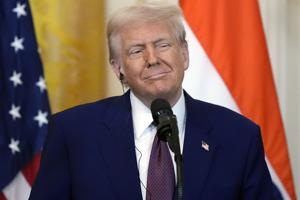Former President Donald Trump’s aggressive stance on international trade, marked by the imposition of significant tariffs, continues to face formidable challenges within the American legal system. Despite achieving some notable concessions in trade talks with various nations, his radical overhaul of long-standing trade policies has not been universally accepted, particularly concerning the method of their implementation. This unique approach, often bypassing traditional legislative processes, has sparked considerable debate and ignited a series of critical legal confrontations.
The core of Trump’s trade strategy involved leveraging substantial tariffs on goods from key economic partners, a move designed to renegotiate trade agreements and protect domestic industries. This strategy frequently saw him sidestep congressional approval, relying instead on executive powers to impose these duties. This unprecedented use of presidential authority in commercial matters redefined America’s global economic posture, leading to both praise from supporters and strong condemnation from critics who viewed it as an overreach.
A notable legal challenge emerged when a three-judge panel of the U.S. Court of International Trade deliberated on the scope of presidential power in setting tariffs. This particular lawsuit is among at least seven significant legal actions that have been brought against the administration’s trade decisions. These cases collectively argue that the former president exceeded his constitutional and statutory authority in imposing such widespread and impactful tariffs.
The plaintiffs in these high-stakes federal court challenges contend that the executive branch overstepped its bounds by enacting broad tariffs without adequate legislative oversight or specific congressional authorization. Their primary objective is to see the most significant and sweeping of these tariffs invalidated and thrown out, a ruling that could significantly reshape the landscape of U.S. trade law and policy for years to come.
These ongoing legal battles underscore a fundamental tension between executive prerogative and the constitutional balance of powers, particularly within the realm of international commerce. The outcomes of these lawsuits are not merely academic; they hold the potential to set critical precedents regarding the limits of presidential authority in economic policy, influencing future administrations’ ability to unilaterally impose trade restrictions.
The legal scrutiny facing these U.S. tariffs highlights the intricate interplay between economic policy, constitutional law, and global trade relations. While the immediate focus remains on the specific challenges to the Trump administration’s actions, the broader implications could extend to how the United States negotiates and enforces trade agreements on the international stage, affecting alliances and economic partnerships worldwide.
Observers eagerly await the final rulings in these cases, as they will undoubtedly provide clearer definitions of the boundaries within which a president can act on trade matters. The resolution of these lawsuits will not only determine the legality of past actions but also chart a course for how future American presidents engage with complex international trade law. The challenges represent a significant chapter in the ongoing narrative of executive power in a globalized economy.






Leave a Reply